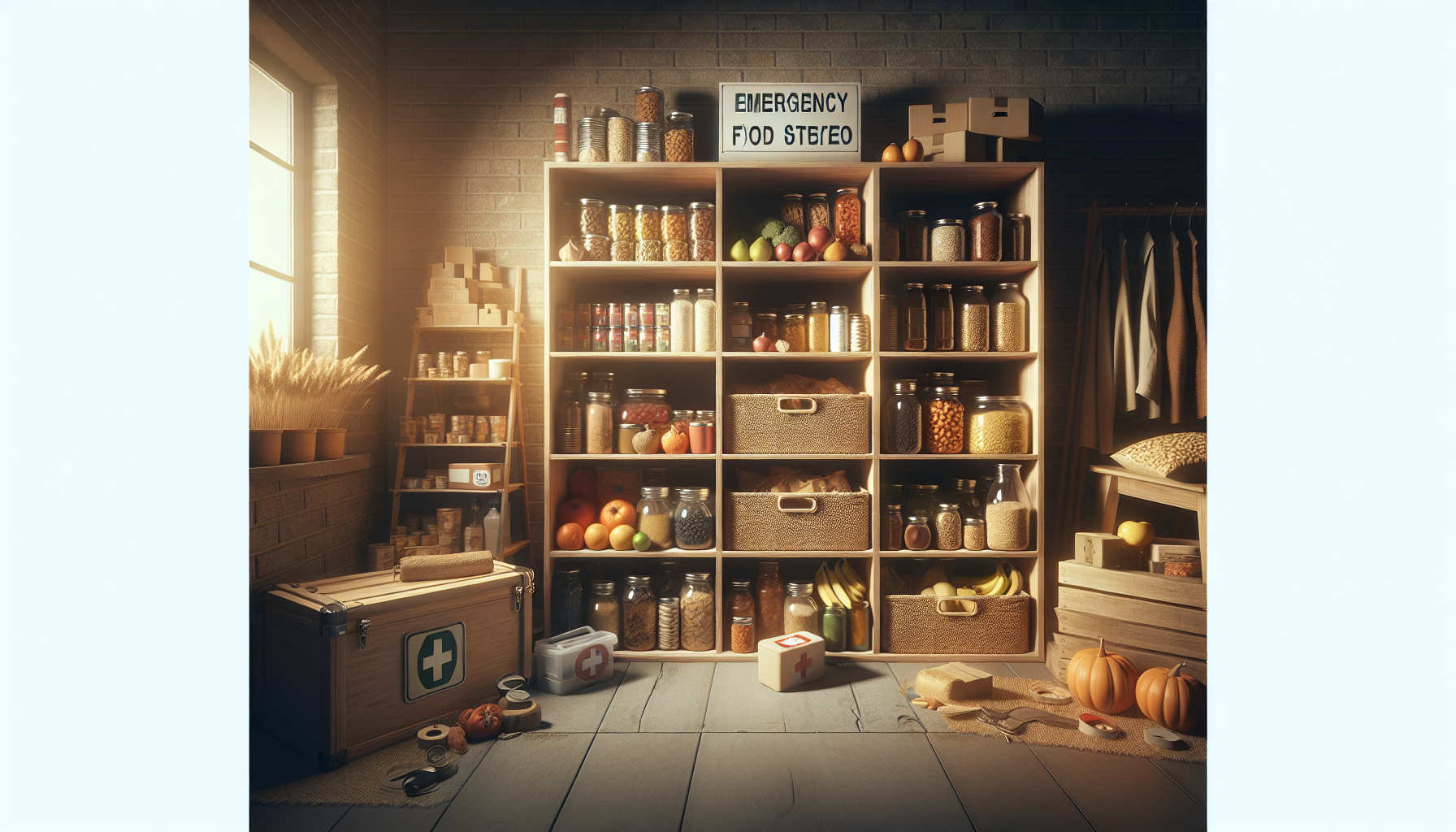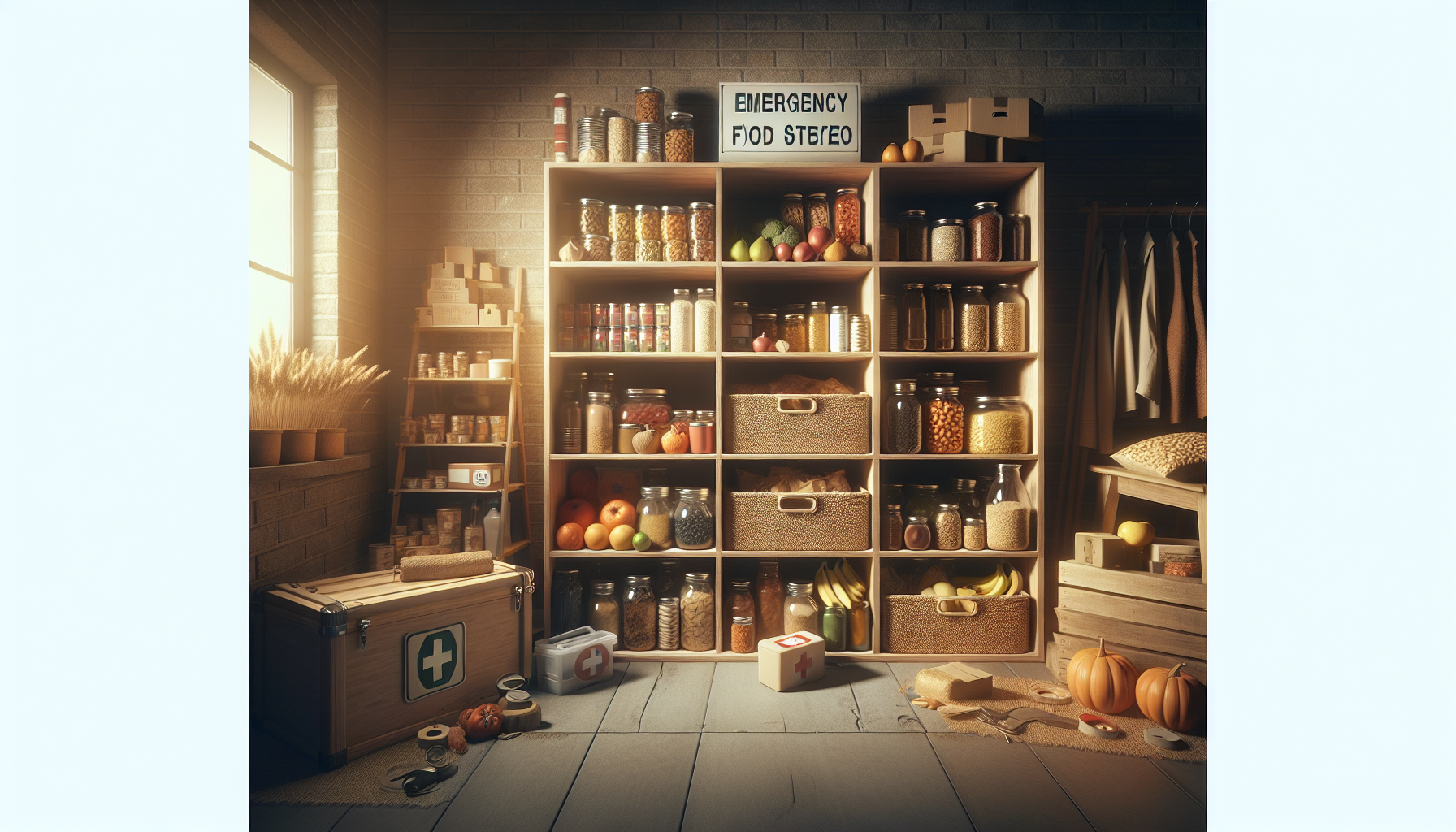In times of uncertainty and unforeseen circumstances, it is essential to be prepared. One crucial aspect of emergency preparedness is having a stockpile of non-perishable foods that can withstand long periods without spoiling. Whether it’s a natural disaster or a global crisis, having a well-stocked emergency food supply can bring peace of mind during trying times. So, what are the best non-perishable foods to consider when assembling your emergency storage? Let’s explore some top recommendations that are not only nutritious but also satisfying to keep you nourished when access to fresh food becomes limited.

Canned Fruits and Vegetables
Benefits of Canned Fruits and Vegetables
Canned fruits and vegetables offer several benefits when it comes to emergency storage. First and foremost, they have a long shelf life, ensuring that you have access to essential nutrients even during a crisis. Canned fruits and vegetables are also convenient and easy to prepare since they are already cooked and ready-to-eat. They retain their nutritional value, vitamins, and minerals, making them an excellent choice for maintaining a healthy diet. Additionally, canned fruits and vegetables require minimal preparation, saving you valuable time and energy when resources might be limited.
Recommended Options
When choosing canned fruits for emergencies, opt for those packed in water or natural juice without added sugars. Some great options include canned peaches, pears, pineapples, and mixed fruit cocktail. It’s also a good idea to have some applesauce in stock, as it provides a quick and nutritious snack.
For canned vegetables, prioritize those with low sodium content to promote heart health. Green beans, peas, corn, carrots, and spinach are all excellent choices. Beans, such as kidney beans or black beans, canned with low sodium content, are also versatile and a valuable source of protein.
Canned Meat and Fish
Benefits of Canned Meat and Fish
Canned meat and fish are valuable additions to your emergency storage. They provide an excellent source of protein, which is essential for maintaining energy levels and supporting muscle function. Canned meats, such as chicken, turkey, and ham, can be consumed as they are or easily incorporated into various dishes. Canned fish, such as tuna or salmon, are rich in omega-3 fatty acids, which promote heart and brain health.
Recommended Options
When selecting canned meats, consider lean options packed in water or their natural juices. Look for chicken breast, turkey breast, and ham, which are versatile and can be used in sandwiches, salads, or as a protein source in cooked meals.
For canned fish, choose tuna or salmon packed in water rather than oil. These can be used in sandwiches, salads, or pasta dishes for a boost of protein and omega-3 fatty acids.
Dried Beans, Legumes, and Lentils
Benefits of Dried Beans, Legumes, and Lentils
Dried beans, legumes, and lentils are excellent options for emergency storage due to their long shelf life and nutritional value. They are packed with fiber, protein, and essential minerals, making them a great source of sustained energy during challenging times. Dried beans, legumes, and lentils are also incredibly versatile, providing endless possibilities for creating nutritious meals.
Recommended Options
Stock up on a variety of dried beans, such as black beans, kidney beans, and chickpeas. These can be used in different recipes, including soups, stews, salads, and even as a base for vegetarian burgers.
Lentils are another fantastic option, as they cook quickly and require no soaking. Red, green, and brown lentils can be used in a variety of dishes, from soups and curries to salads and side dishes.
Rice and Pasta
Benefits of Rice and Pasta
Rice and pasta are pantry staples that should not be overlooked when it comes to emergency storage. They are affordable, have a long shelf life, and provide a good source of carbohydrates for energy. Rice is easy to cook and can be a versatile base for various dishes, while pasta offers a quick and satisfying meal option.
Recommended Options
Opt for long-grain white rice or whole grain rice for a nutritious and versatile staple. Rice can be used as a side dish, added to soups or stir-fries, or even used in desserts like rice pudding.
When it comes to pasta, choose options like whole wheat or whole grain varieties for an extra dose of fiber and nutrients. Stock up on different shapes such as spaghetti, penne, or macaroni to add variety to your meals.

Canned Soups and Broths
Benefits of Canned Soups and Broths
Canned soups and broths are convenient and comforting options for emergency storage. They provide a quick and nourishing meal that requires minimal preparation. Canned soups often contain a combination of vegetables, protein, and carbohydrates, making them a well-rounded option for a balanced diet during emergencies. Broths, on the other hand, can be used as a base for homemade soups or as a flavor enhancer for other dishes.
Recommended Options
Choose canned soups that have a lower sodium content and are packed with vegetables and lean proteins. Vegetable soups, chicken noodle soups, and minestrone soups are great choices. If possible, opt for soups with BPA-free cans for a healthier option.
When it comes to canned broths, chicken and vegetable broths are versatile and provide a flavorful base for various recipes. Look for low sodium options to control your salt intake.
Peanut Butter and Nut Butters
Benefits of Peanut Butter and Nut Butters
Peanut butter and other nut butters are not only delicious but also a valuable addition to your emergency supply. They are packed with protein, healthy fats, and fiber, making them a nutrient-dense food. Peanut butter and nut butters are shelf-stable and can be easily incorporated into meals or enjoyed as a quick snack.
Recommended Options
Opt for natural peanut butter or other nut butters with minimal additives or sugars. These options generally have a higher nut content and fewer unhealthy ingredients. Peanut butter can be used as a spread on bread, added to smoothies for an extra protein boost, or enjoyed with fruits for a quick and satisfying snack.

Oats and Granola Bars
Benefits of Oats and Granola Bars
Oats and granola bars are excellent choices for emergency storage due to their long shelf life and versatility. Oats are a great source of fiber, complex carbohydrates, and provide sustained energy. Granola bars, especially those made with whole grains and natural ingredients, offer a convenient and portable snack option.
Recommended Options
For oats, choose rolled oats or steel-cut oats for a nutritious and hearty breakfast option. Oats can also be used in baking or added to smoothies for added fiber and nutrition.
When selecting granola bars, opt for those made with whole grains, nuts, seeds, and dried fruits. Avoid options with high added sugars and artificial ingredients. These bars can serve as a quick and satisfying snack or as an on-the-go breakfast option.
Canned Milk and Dairy Products
Benefits of Canned Milk and Dairy Products
Canned milk and dairy products are valuable for emergency storage as they provide a source of calcium, protein, and other essential nutrients. They have a much longer shelf life compared to fresh milk and can be easily incorporated into recipes or enjoyed as a standalone beverage.
Recommended Options
Evaporated milk is an excellent choice for emergency storage as it offers a longer shelf life compared to regular milk. It can be used as a milk alternative in recipes, such as soups, casseroles, or desserts. Additionally, canned coconut milk can also be a great option to have on hand, as it is versatile and can be used in both sweet and savory dishes.
For dairy products, consider canned cheese or powdered milk. These options can be used in recipes or rehydrated for beverages.

Canned Beans and Chili
Benefits of Canned Beans and Chili
Canned beans and chili are nutritious and satisfying options for emergency storage. Beans are a fantastic source of protein, fiber, and essential minerals. Canned beans are already cooked and ready to eat, making them convenient and time-saving. Chili, on the other hand, provides a hearty and flavorful meal option that can be enjoyed on its own or combined with other ingredients.
Recommended Options
Stock up on a variety of canned beans, including kidney beans, black beans, pinto beans, and garbanzo beans. These can be used in a wide range of recipes, such as salads, dips, or as a filling for burritos or tacos.
Canned chili is a convenient option for a quick and satisfying meal. Look for options with a variety of beans and vegetables, and choose those with lower sodium content to promote heart health.
Conclusion
When it comes to emergency storage, it’s crucial to choose non-perishable foods that provide essential nutrients and are versatile enough to create a variety of meals. Canned fruits and vegetables, meats and fish, dried beans and lentils, rice and pasta, soups and broths, peanut butter and nut butters, oats and granola bars, milk and dairy products, and canned beans and chili are all great options to consider. By stocking up on these items, you can ensure that you have a well-rounded and nutritious food supply to sustain you during unexpected situations. Remember to rotate your stock and check expiration dates regularly to maintain the freshness and quality of your emergency food supply. Stay prepared and stay healthy!


